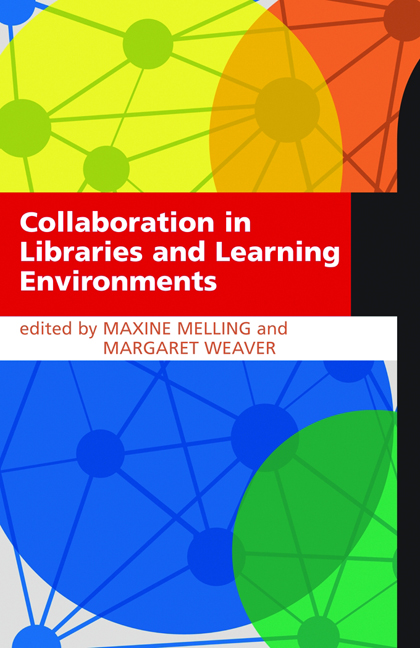Book contents
- Frontmatter
- Contents
- Contributors
- Introduction
- Abbreviations
- 1 The changing higher education context
- 2 Connecting with the student perspective
- 3 Working with professional associations
- 4 Culture, values and change: observations from three consortia in Canada
- 5 Managing complex change collaboratively
- 6 Leadership skills for collaboration: future needs and challenges
- 7 Knowing me … knowing you: the role of technology in enabling collaboration
- 8 Space: changing the boundaries
- 9 Collaborative service provision through super-convergence
- 10 Joint-use libraries and transformational change
- Index
9 - Collaborative service provision through super-convergence
Published online by Cambridge University Press: 08 June 2018
- Frontmatter
- Contents
- Contributors
- Introduction
- Abbreviations
- 1 The changing higher education context
- 2 Connecting with the student perspective
- 3 Working with professional associations
- 4 Culture, values and change: observations from three consortia in Canada
- 5 Managing complex change collaboratively
- 6 Leadership skills for collaboration: future needs and challenges
- 7 Knowing me … knowing you: the role of technology in enabling collaboration
- 8 Space: changing the boundaries
- 9 Collaborative service provision through super-convergence
- 10 Joint-use libraries and transformational change
- Index
Summary
Introduction and background
Traditionally, large organizations operate through structured units with a common focus and organized around budget and reporting lines. This use of infrastructure allows people working in organizations to maintain a span of control that makes sense to them and their colleagues, allowing the organization to manage its resource effectively. However, it's only a small step from developing these internal, necessary conveniences to presenting the organization to customers and stakeholders as if the reporting and budget lines represent the true nature of the organization. The stakeholder's perspective can become lost and they are expected to understand and navigate internal boundaries that have little relevance to their needs and interests. As Mark Clark has written,
Users [of services] know what they need but fail to categorise the support needed and to differentiate between silos.
(Clark, 2005, 160)This comment appears to suggest a failure of necessary understanding by service users. However, organizations should seek to present services in ways that mirror user needs rather than in a way that demonstrates how the organization chooses to manage itself. Users then have no need to understand or differentiate between internal organizational boundaries (silos).
This tension between organizational infrastructure and service-user needs has been recognized by large public service providers, and there are good examples in the UK of how local councils in particular have sought to present public services in a seamless way, including the Life Centre provided by Wigan County Council (see www.wigan.gov.uk/Services/CouncilDemocracy/WiganLifeCentre). Similar developments have also taken place in some UK universities through the creation of ‘super-converged’ service departments, which seek to present student support from the student's point of view.
The first recorded use of the term super-convergence to describe service team structures is in the notes of a meeting of academic library service directors in early 2009 (Heseltine et al., 2009). The directors had met to consider a relatively recent phenomenon – the bringing together of a significant number of different services to form a multiply converged ‘super’ service team. They were seeking to explore whether this development in service provision was a passing fad or a growing trend, as well as wishing to share experiences in order to identify and develop best practice in leading such services. Since that first discussion there has been a growing trend towards super-convergence in UK higher education, with about 30 services now existing that might be described as super-converged.
- Type
- Chapter
- Information
- Collaboration in Libraries and Learning Environments , pp. 149 - 166Publisher: FacetPrint publication year: 2012



